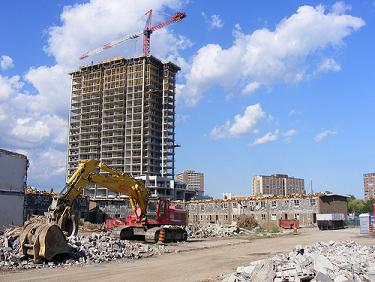Got change? Want change? Spare some and get some by becoming a member of rabble.ca today.
A recent Star piece by two criminologists brought a new gaze to the idea of community. It examined reconstruction of public housing in Toronto’s Regent Park, where many poor families were moved out while middle-class homes were built, then moved back alongside the newbies. The theory was to spread good influence, like fairy dust, from the successful to the benighted, providing “positive role models who could transmit more mainstream standards of behaviour.” The criminologists found there wasn’t much influence, since there wasn’t much contact. And more scandalously, the underclasses didn’t feel their standards needed heavy upgrading. In fact, their own solid values of community and mutual support were somewhat undermined by the transformations. That’s too brief but I found it a stimulating springboard for thoughts about community.
– It isn’t community if all the influence and modelling flows one-way. In a community everyone has something to offer each other. That was even true — at least rhetorically — in feudal “communities,” where mutual needs and obligations between lord and serf were the basis. Otherwise, you get an attack or invasion by one side, and it’s perceived that way. There’s been a similar effort to create a housing mix in Toronto’s former Don Mount Court, along the Don River. In the process, the area’s name got changed to Rivertowne: one word. That coy “e” is the tipoff. You can guess which group it was meant to please. Kids on the local soccer team still refuse to go along. They kept Don Mount on their team shirts.
You can see what irks them. Why all the stress on crimes engendered in public housing? What about the far more socially disastrous crimes committed by out-of-control hedgies and bankers, incubated in wealthy downtown areas and suburbs? Royson James once asked why no one worries about lack of social diversity in Rosedale or Forest Hill. I’d even argue that a source of the vote for Rob Ford as mayor was people who saw David Miller as a well-meaning guy who moved into the mayor’s office planning to show them how to behave.
Councillor Adam Vaughan, whose downtown ward includes the Alexandra Park co-ops, thinks “cohesion” can arise from within the community, when some of its members rise in station — largely through education — but stay there. That would be a different kind of community-building, and no way an invasion.
(Actually, as a kid I was part of a tiny attempt to diversify Forest Hill. We moved there from Christie Pits but didn’t really have the money and I never managed to read the codes or feel a part of it. The result, I think, was that I became a writer, i.e., an outsider. Would that count as a success or a failure?)
– These public housing rejigs look like perfect cases of social engineering, which always has a foul sound. But I’m not sure human beings, who see themselves conscious and purposeful, can ever quite escape that category, no matter how unconscious of our deeper purposes we really are. Public education was probably an admirable case of social engineering, and achieved many goals of community and integration — though it’s now being reverse-engineered by the Toronto board and director Chris Spence, to “reprivatize” the system and undo its potential. I doubt anything could be more socially engineered than Stephen Harper’s program of prison-building and stiffer sentencing to fill them — while simultaneously cutting the legs off the funding for public housing. It’s really a question of whose social purposes get engineered, on whom.
– Don’t romanticize community; it doesn’t imply perfection. I once toured P.E.I. with some writers, including the gay, flamboyant Quebec poet, Jean-Paul Daoust. One lunchtime, we read at a church in a perfect seaside community: rotting hulks along the beach, women in flowing skirts and floppy hats riding by on bicycles. Afterward, Jean-Paul regarded the lovely clapboard houses from the church steps and sighed: “I guess they are full of horrors, just like everywhere else.” I suggested we check so we stopped a cyclist. “You better believe it,” she said. “Especially in winter.” You’re not aiming at perfect harmony, you’re trying for community. Utopia was no community and won’t ever be.
This article was first published in the Toronto Star.



